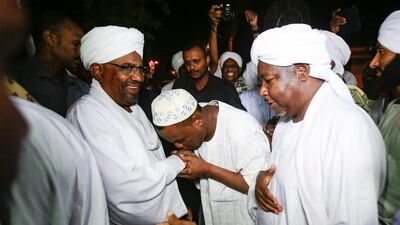Sudanese activists and rights groups have little faith that security personnel will be held accountable for killing, injuring and unlawfully detaining protesters despite promises by President Omar Al Bashir to investigate "recent events".
The promise was made amid the largest anti-government demonstration since protests erupted on December 19. Protesters were again dispersed by tear gas and live ammunition, while dozens of people were detained.
Activists say the harsh crackdown has resulted in the deaths of 40 protesters. More than 200 demonstrators have also been detained. Many have been released, but others are at risk of mistreatment and torture, with at least two people having reportedly died in detention so far.
“Many leaders [of opposition groups] and heads of unions are still in prison,” said Saif Al Yazal, a Sudanese political exile in Sweden who is collaborating with activists on the ground to monitor detentions and casualties. “Everyday people are being arrested, but we’re doing our best to provide reliable data.”
Kamal Boulad, the leader of the Sudanese Baath Party, is just one notable figure who has been detained. He was taken from his workplace at a chemical factory on December 28. His wife said she received a call from Mr Boulad to say that he was in police custody but had not received any news about him since.
"I don't believe that Al Bashir will do a real investigation. He has made similar promises in the past but [the investigations] never accomplished anything," Mrs Boulad told The National.
_______________
Read more:
Sudanese political parties ramp up calls for Bashir to step down
Sudan restricts social media access to counter protest movement
Persistent protests testify to deep-rooted anger in Sudan
_______________
The last time the government promised an investigation was after the deaths of 170 people during protests against subsidy cuts and austerity measures in September 2013. Other protesters – particularly from Darfur - were arrested and subjected to torture and other ill treatment.
Jehanne Henry, associate director of Human Rights Watch Africa Division, said that only one officer was convicted of killing protesters but was acquitted soon after the trial.
Regime officials tried to bribe victims’ families to stop them from pursuing justice, she said.
"Most families refused to take any money and this next probe will probably also just be for show," Ms Henry told The National.
“The real issue right now is that I would like to see the government condemn the use of live ammunition against protesters, which it has never done and is never justifiable.”
Just as in 2013, Mr Al Bashir is either denying the scale of violence or smearing protesters as mercenaries and foreign agents.
Ms Henry says student activists from Darfur might be most at risk in the latest unrest, with 45 arrested and many facing bogus charges such as fighting with armed groups that are colluding with Israel.
A Darfuri activist who goes by the name Obama told The National that Sudan's National Intelligence and Security Service – which is notorious for grave human-rights abuses – was searching for him.
Two agents visited his home and his uncle’s house in the city of Omdurman to ask about him, he said. Once he was warned, he quickly boarded a bus and fled the city.
Despite his ordeal, Obama insists that he is luckier than many of his colleagues, one of whom was shot in the head during a demonstration.
“I just don’t believe any of us will ever get justice,” he said. “Justice in Sudan is a kind of theatre because there is no separation of power. All the power is in the hands of the regime.”

